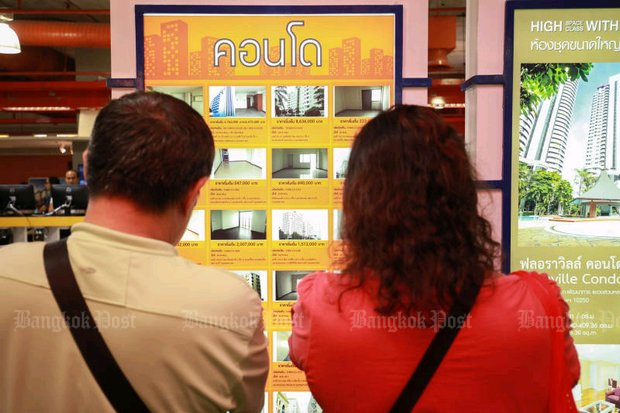
The Bank of Thailand is concerned about the risk of weaker demand for condominiums from foreigners, Chinese buyers in particular, as the global economy slows, the central bank's chief says.
The global economic downturn could dampen foreign demand for condos in Thailand and create a higher risk of excess supply, said governor Veerathai Santiprabhob.
Foreign demand, particularly from Chinese condo buyers, has continued to increase, he said, and the central bank is keeping a close eye on the property surplus.
According to central bank data, the proportion of condo ownership transfers by foreigners surged to 31% in the third quarter of last year from 27% in 2017 and 21% in the previous year. Money transfers made for condo purchases by foreigners reached 68 billion baht in the July-September quarter of 2018.
Residential and mortgage sector risks have declined to some extent after the central bank announced tighter mortgage lending regulations for loan-to-value (LTV) ratios, but loan-to-income (LTI) ratio remains on the rise, Mr Veerathai said.
The LTI rose to 3.7 in the third quarter of last year from 2-3 in 2013. Mortgage accounts with LTIs over five times accounted for 31% of the total in the three months to September, up from 27% in 2017, 25% in 2016, 17% in 2015 and 13% in 2014.
Deputy governor Mathee Supapongse said the global economic slowdown could compel foreigners to give up a down payment on condominiums in Thailand, which would aggravate the oversupply situation in the condo market.
"Even though they always purchase condominiums with cash, we're wary that they will give up down payments amid the economic slowdown," Mr Mathee said. "The supply surplus will increase and create risks."
Starting from April 1, homebuyers require a minimum down payment for third and subsequent mortgages of 30% of home price, but the minimum requirement for a second housing loan is 10-20%, depending on how long a borrower has made payments on the first one.
For those who seek a second mortgage to fund the purchase of a home priced at 10 million baht or higher, a minimum 20% down payment is required.
Mr Veerathai has raised concerns about underpricing risk in corporate loans and urged banks to strengthen risk management.
Underpricing risk for large companies stems from several issues, especially greater competition in the banking industry.
For instance, banks offer one-year bridge loans to customers before they raise funds from the equity market to pay off the debt, Mr Veerathai said, adding that the practice could lead to higher risk.
The central bank found that the country's 20 biggest corporations dominate with 55% of total bond issuance and 53% of funds raised from the equity market. They account for 38% of the country's total borrowing from overseas and 12% of domestic loans.
The Bank of Thailand is also looking for search-for-yield behaviour in savings and credit cooperatives after their assets continued to increase from 2016. As of September 2018, savings and credit cooperatives' total assets and deposits represented about 10% of deposits outstanding in the banking industry, the governor said.
The sharp increase in lending extended by savings and credit cooperatives could rattle financial stability, Mr Veerathai said.
